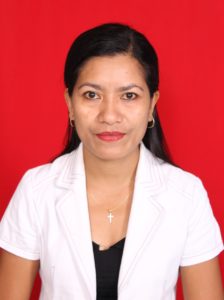Conference Speakers
Dr Joanita Jong
Director of Veterinary Services in the Ministry of Agriculture and Fisheries and Coordinator of the Timor-Leste Village Poultry Health and Biosecurity Project
 Joanita Jong, Timor-Leste’s first female veterinarian, is the newly appointed National Director for the Veterinary Directorate in Timor-Leste’s Ministry of Agriculture and Fisheries. As a National Director, her role is to supervise three departments: the Department of Public Health and Animal Welfare, the Department of Controlling Medicines and Equipment for Animals, and the Department of the Veterinary Diagnostic Laboratory. All three departments play very important roles within the country’s animal health development. Joanita Jong, Timor-Leste’s first female veterinarian, is the newly appointed National Director for the Veterinary Directorate in Timor-Leste’s Ministry of Agriculture and Fisheries. As a National Director, her role is to supervise three departments: the Department of Public Health and Animal Welfare, the Department of Controlling Medicines and Equipment for Animals, and the Department of the Veterinary Diagnostic Laboratory. All three departments play very important roles within the country’s animal health development.
Joanita is responsible for the supervision of data collection for Timor-Leste’s national animal disease reporting system, the management of data collected from vaccination programs for cattle, buffalo, pigs and chickens, as well as performing ante- and post-mortem inspections at the national slaughter house. In her ten years there, Joanita has made significant contributions to the development of her profession through capacity building within the country’s network of Livestock and Veterinary Technicians, Extension Workers and other animal health staff, as well as local and international NGO’s.

Abstract
Food loss and waste in Timor-Leste has been identified as a critical factor contributing to human undernutrition. Our project enhances natural scavenging systems by improved poultry production, with improved management, vaccination against Newcastle Disease (ND) and logistical support. We are working with Sydney University to implement the sustainable use of heat tolerant ND vaccine, administered as eye drops triennially by trained paraveterinarians.
The Australian Department of Agriculture and Water Resources conceived and jointly manages the project with the Timor-Leste Ministry of Agriculture and Fisheries. They provide training in national biosecurity and biosecurity practices applicable to village poultry. Management systems are supported with locally made shelter to protect from predation. With the help of Berrimah Veterinary Laboratory we are improving cold chain management and vaccine potency verification. The project is funded by the Australia Department of Foreign Affairs and Trade.
Increased poultry production with these improved systems leads to improved scavenging systems – more hens equals more effective searching for scraps, insects and other invertebrates as they fend for themselves with minimal carbohydrate input provided by their owners. In return more hens are available to produce eggs for sale or chickens for consumption. Each of these activities results in better availability of balanced protein and bioavailable micronutrients for growing and lactating humans. Once households observe that their flock dynamics are no longer subject to dramatic decreases, the consumption of eggs becomes an option rather than prioritising them for hatching to obtain replacement birds.
|



 Joanita Jong, Timor-Leste’s first female veterinarian, is the newly appointed National Director for the Veterinary Directorate in Timor-Leste’s Ministry of Agriculture and Fisheries. As a National Director, her role is to supervise three departments: the Department of Public Health and Animal Welfare, the Department of Controlling Medicines and Equipment for Animals, and the Department of the Veterinary Diagnostic Laboratory. All three departments play very important roles within the country’s animal health development.
Joanita Jong, Timor-Leste’s first female veterinarian, is the newly appointed National Director for the Veterinary Directorate in Timor-Leste’s Ministry of Agriculture and Fisheries. As a National Director, her role is to supervise three departments: the Department of Public Health and Animal Welfare, the Department of Controlling Medicines and Equipment for Animals, and the Department of the Veterinary Diagnostic Laboratory. All three departments play very important roles within the country’s animal health development.